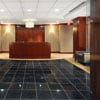Know these 4 things about your law practice before choosing Midtown shared office space and find the best balance of flexibility and stability for your firm.
Moving a law office always results in lost billable time.
As a practitioner, I tried to not move my firm’s office more than once every five years. But this can be tricky.
For many attorneys, your practice will likely to change a lot in five years. Finding an office space that has that perfect mix of flexibility and stability can be difficult.
Doing so requires having a solid understanding of these four things.
1. Which working environment will make you most productive?

Give some thought about the different features in your current (or past) office that helped you be most productive. Was the culture collaborative? Sterile? Quiet? Were people friendly or did they stick to themselves? What was your office like? How much space did you have? How did it feel, was it roomy or cramped?
When selecting an office for your firm, we suggest that you consider the following items, which are listed in priority order:
1. Building location. Look for something that is not only convenient to you, but also your clients.
2. Your physical workspace. You can sublease office space in the nicest NYC building, but if your workspace is a hovel, then you will not be happy or productive.
3. The conference rooms. Next to your office, you’ll probably spend the most time in conference rooms. Make sure they will meet your typical needs, and more importantly, will be available when you need them.
4. The office suite, including reception. If you had to choose between a workspace that makes you happy or a reception area with designer chairs and modern art, go with the former. An office suite that is “nice enough” will not prevent you from retaining clients, but will also not make the client think that your rates are inflated to pay for the designer furnishings.
5. The building lobby. Most buildings where Midtown shared office space is located have decent lobbies. The market simply demands it. Frankly, the threshold for building lobbies is that there should be nothing offensive about it (odors, disrepair, etc.). That’s a low bar.
6. The building exterior. Frankly, for attorneys the exterior design of the building is irrelevant. The only people who look up in Midtown, New York City are tourists and architects. No client will refuse to retain your firm because of what the exterior of your office building looks like.
2. What’s your real budget?

But if you are choosing between an office that you really like but that stretches the budget, or one that doesn’t get you excited but is within the budget, go with the bigger office (within reason, I’m not advocating irresponsibility. I would prefer not contemplating legal remedies).
Time and time again we’ve seen that attorneys who take the nicer space play a “bigger game”. As compared to their colleagues who play it safe, the attorneys who stretch not only find a way to pay for the extra expense, but they grow their practices much more rapidly.
So, as you figure out your budget, come up with a range the high point of which may be a stretch for you. Then go shopping for space.
3. What services must your practice have?

1. What you absolutely require.
2. What would be nice to have.
3. What you can definitely live without.
When looking at different office options, in order to compare “apples to apples” you need to really understand what is included as part of the deal. If the services your firm absolutely requires are not included (or are inadequate), then you will have to pay for these things on your own. One or two of these items can significantly increase the cost of your law office rental.
For example, take your typical Midtown shared office space. In many executive suites, Internet is included as part of your rental fees. Executive suites, being in the business of renting space, tend to have high-end internet service.
Internet service is usually included as part of the deal in sublet office space as well. But it will only be as good as what the sublessor is willing to purchase. If you’re planning to run your firm from the Cloud, a slow internet connection will not only reduce productivity, it may make you crazy. You’ll soon be finding yourself purchasing a $700 per month T1 service.
4. What kind of people do you want around you?

Your firm may be big enough to have this collaborative environment on its own. Maybe you just don’t care to be around other lawyers. For the rest of us, it makes the most sense to find Midtown shared office space.
But who you find in a shared office space may be a mixed bag.
In a typical Manhattan law office sublet, you may find lawyers who are open to collaboration. These are typically office situations where there are a number of small law firm subtenants. What’s more common though is sublessors who simply want you to pay timely and leave their attorneys alone so they can bill.
Executive suites can be a more collaborative environment, but unless you rent from an executive suite for law firms, you may find an odd mix of clientele ranging from traders to tailors. Different professionals have different work habits that don’t always lend well to sharing space attorneys, who require quiet and, above all, privacy.
We secret shop our competitors often and in the Insider’s Guide to Renting the Perfect Law Office, we’ve shared some of the astonishing things we’ve witnessed.


